News and views from our community
-
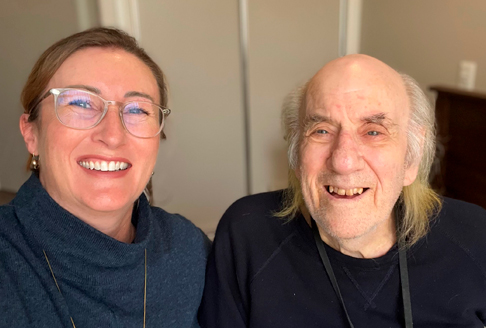
National Volunteers Week 2023 Meet Digital Stories volunteer, Jo Lister
An occupational therapist by profession, Jo’s motivation for currently studying counselling (with an aim to practice within the aged care setting) explains why she is such a great fit for her current volunteering role at Baptcare – namely, to befriend and create a digital story of Hedley Sutton resident, John.“If people don’t feel seen or understood, then change is more difficult. If people have their emotions validated, it’s easier for them to go forward and make changes in their life,” said Jo.Jo definitely makes John feel seen and heard. She is clearly one of the change makers upon whom this National Volunteer Week is based.What is your professional background?I am an Occupational Therapist (OT) and am currently studying a Graduate Diploma in Counselling.Why Counselling?I’ve always been drawn to the talk-therapy side of my practice. I find it really makes a difference for clients and is rewarding, so I’m developing my skills in this area. I’m loving the study!What drew you to volunteering?I wanted to give something back. My children are older now, so I felt that I had the time and space to do some dedicated volunteering.Have you done any volunteering in the past?I have done two weeks volunteering in a Sri Lankan kindergarten and taken on voluntary roles at my children’s school, but nothing ongoing.This Swinburne Digital Story project is my longest volunteering commitment.What is involved in creating the digital story?I’ve made a minimum commitment of 2.5 hours each week. In addition to the weekly 90-minute training at Swinburne on reminiscence therapy and digital storytelling skills, I spend an hour visiting with John at Hedley Sutton and hearing his stories. Finally, I will create a digital story product for John.What drew you to the Digital Story Program Aged Care?As a Graduate Diploma of Counselling student at Swinburne, I received an email from Swinburne advertising the project. I started volunteering in January 2023, but the recruitment process started in late 2022.Most of my career has been working with older adults and it’s the space I want to work in as a counsellor.I’ve spent a lot of time in residential aged care (RAC) communities and can see the incredible value digital stories can give to the RAC staff, as well as the resident.Research has shown that the digital story has the potential for the staff to view the resident profiled as a whole person - someone with a rich history and a life before they moved into residential care, and hopefully that helps the staff and resident to find a connection. It also acts as a person-centred training tool.What do you enjoy about volunteering with the Digital Story Program Aged Care?I really believe that the digital stories have potential to make a difference.I sit for an hour and listen to John and hope that he enjoys sharing his stories. It’s wonderful that he gets to have a full identity and to be reminded of the things he’s achieved and to be actively heard and seen.I enjoy spending time with John. We laugh and joke together and have an easy rapport. (I even tease him a bit!). I also enjoy hearing him reminisce about his life and think it’s a powerful thing for him to be able to tell his stories.Why do you like volunteering?It feels good!I feel like it’s a little thing I can do that might make a difference to someone’s life and that feels good.It’s not a huge time commitment and even if it makes a little difference, that feels worthwhile.
- 12 May 2023
-
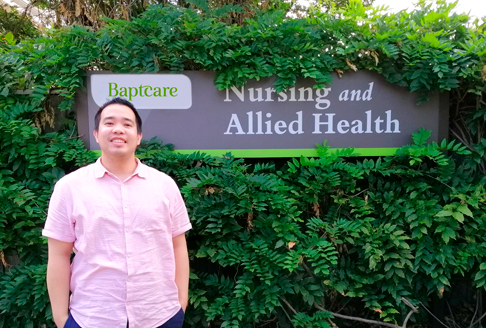
Meet Mark Castro, our Faces of Baptcare #40 and new member of the In Home Care team
What is your role at Baptcare, and can you describe a typical day in your job?I'm currently stepping up as the Interim In Home Care Nurse Manager. I was previously one of the clinical care leads of our nursing team. Our team aim is to make sure all patient care is well co-ordinated. On my average day of work, I usually start by checking emails, then I spend most of my day taking phone calls from colleagues and carers working in the field. There are also regular calls from other departments and families.What do you like about working with Baptcare and in the IHC space? What I really like with Baptcare is the sense of community.Did you always want to work within the caring space?Well, apart from my dreams of being a professional sportsman – yes! My parents encouraged me to pursue nursing studies as a way of pursuing ‘the greener pastures’ as we always say in my birth country, The Philippines. And I’m glad that I’ve followed this path. Working in the healthcare industry gives me opportunities to learn new and exciting things every day while giving care to people who need my help. My personal and professional growth is nurtured in this space.What did you want to be when you grew up?When I was young, I really wanted to play sports professionally. I used to play basketball but nowadays I just watch it.Can you tell us two surprising things about yourself?I do photography as a hobby. Also, I can cook and bake when asked to although I can’t promise it will be good (but at least I try!)Tell us about your photography.I don’t have a favourite photographer, but I follow the works of Sam Kolder, Chris Burkard, Dani Diamond and Brandon Woelfel. I do a mix of landscape, astrophotography and portrait photography. One of my photos recently won a local camera store competition which was really exciting. (Ed. Photo included in this article!).We hear that you’re a new dad? Tell us about your baby and what has surprised you about parenting so far.Yes, I am a father to Matteo who just turned six months recently. The saying that time flies is an understatement! It feels like yesterday that my wife and I were at the hospital waiting for Matteo to arrive. He's such a sweet and observant little boy and has recently been attending baby sensory classes and really enjoys them.What surprises me the most is that 24 hours is too short when you have a baby. Also, I never knew I could worry so much about him. The love you have for your child is really special and it’s really the best feeling for me and my wife.I’d like to acknowledge all the other full time working parents (dad and mums) out there who are also heavily involved in raising their children.Do you have a favourite quote or motto in life?Respect is earned by action alone, not self-gratification. (Paul Combs)How would your friends describe you?My friends would describe me as a silent, easy-going type of guy, but helpful and approachable.Can you describe your ideal weekend?An ideal weekend for me would include some free time for myself – free from the usual hustle and bustle of the working week. It would involve catching up on some sleep and an excuse to avoid a routine. I enjoy hanging out with my family or our friends over a barbecue or going for long drive to take unique photos. It may also involve going on an outdoor family adventure and spending quality time with my family, especially as a new dad.Do you have a mentor or idol? I would say that I idolise my parents for everything they have done to ensure that me and my siblings can be successful.
- 02 May 2023
-
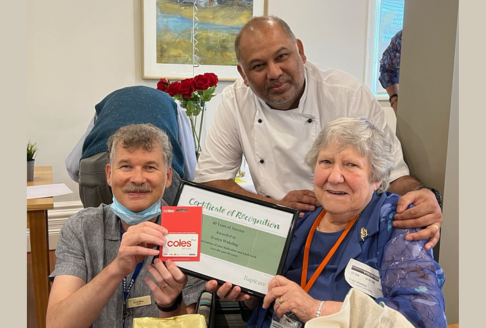
Congratulations to Evelyn Wakeling | Celebrating an amazing 40 years of volunteer service at Baptcare
Recently, the team at Baptcare came together in celebrating an astounding milestone – 40 years of volunteer service by our much-loved team member, Evelyn Wakeling.The festivities started with a service of thanksgiving at our Hedley Sutton Community in Canterbury. Evelyn is a talented volunteer pianist at Baptcare. Funnily enough, even though to the service was to celebrate and thank Evelyn, she provided the piano accompaniment as cherished hymns were sung to honour her service.A special lady with a very special talentEveryone attending was transported by Evelyn’s flawless performance of Oh, love that will not let me go.The hymn was published in 1882 by George Matheson, a Scottish minister who went blind at an early age and was spurned by his fiancée who couldn’t face life with a sight-impaired husband. He wrote the verses on the eve of his own sister’s marriage, at a time when he was alone and no doubt, reflecting on his own personal loss and hardship:Oh, joy that seeks me through the painI cannot close my heart to TheeI trace the rainbow through the rainAnd feel the promise is not vainThat mourn shall tearless beEvelyn effortlessly conveyed the emotion of the piece . She has been playing since the age of five, so we were in expert hands.“I started lessons quite young – my father was a trained baritone singer and I guess the family thought I could learn piano and accompany him,” laughed Evelyn.But there’s something more to her skill than just decades of practice and performance. Pressed further to explain how she manages to convey such beautiful emotion with her playing – and bring a 140-year-old hymn to life, Evelyn’s formula was simple in its brilliance. “I play the words – not the music,” she said. “That’s the key. And that’s what is important to me.”Therein lies the essence of her magic. Evelyn instinctively feels the meaning behind the lyrics and it flows from mind to body as the most perfect expression of emotion. The piano filled Hedley Sutton’s lounge area with waves of warmth, hope and tenderness.A powerful teamEvelyn’s appreciation of the beautiful hymns we sang can be traced back to the early 1980s at the East Kew Baptist Church. Her husband was the pastor of the church, preaching at Hedley Sutton and Karana services. Evelyn would arrive early, playing piano as the residents streamed in accompanied by their Carers. The older hymns were firm favourites. “They may not have known the words, but they knew the melody,” she says. “Even when they’ve forgotten the words, they can hum along to the music.”Sadly, Evelyn’s husband passed away in 2000 – but her motivation to continue playing for our residents never dimmed. “My husband and I were a team,” explains Evelyn, “and I just wanted to continue after he died. I feel so loved and needed by everyone. That’s important for all of us.”A poem of thanks to mark 40 years of serviceThe feelings of gratitude and appreciation from all of us at Baptcare are best summed up by another much loved member of our team, Hedley Sutton’s chaplain, David Ware. A talented poet, he delivered the beautiful sentiments of everyone present in his new piece, ‘Super Glad’ (excerpt below):The magic’s found in spiritAnd a soul infused with heartA faith that has no limitsIn which we all do share a part. It’s seen in every gift we bringAnd in generous friendship foundIt’s grounded in a daily careThat continues to astound. Today we pause to celebrateSo much that has been doneAs we give thanks for hope’s promisesAnd for all we’ve shared as one.Once the service finished, we adjourned to the Hedley Sutton café where balloons and flowers cheerfully celebrated Evelyn’s 40 years of volunteer service. The tables were quickly filled by residents, volunteers, staff and friends who all adore Evelyn .David spoke with joy about meeting Evelyn back in 2014. “The piano we had back then came out of Noah’s Ark, I think!” he said with a sparkle in in his eye. “A couple of keys didn’t work but that didn’t matter to Evelyn – her playing flowed so beautifully.”Others in the room spoke not just to her musical talents but also to Evelyn’s generosity of spirit.“So lovely and easy to work with.”“A great team player – so flexible!”The compliments were overflowing. Forty years of volunteer service is a tremendous milestone and, perhaps, a record at Baptcare.Fond memories and friendships Interestingly, Evelyn’s connection to Baptcare reaches further back than her commencement as a volunteer in the 1980s. Her mother was involved in the Victorian Baptist Women’s Association which was integral to the establishment of Strathalan, which marked the beginning of our not-for-profit organisation in the 1940s. “Mum always talked about how important it was to be doing something for senior citizens and providing services for them,” said Evelyn. And so, from mother to daughter, the seed of compassion and service was planted and has grown to bear this remarkable fruit of 40 years of volunteering.Evelyn has so many fond memories from across the years. “People thank me for my hard work, but the word ‘hard’ doesn’t come into it,” she chuckled. From remembering sitting with her treasured friend, Glennys, over lunch after finishing her volunteer shift, to recalling good times with another chum, Margaret. “Such an encourager!” explains Evelyn when speaking of Margaret. “Her memories of the old days were amazing! She loved her football and her tipping.” To meeting another fellow ‘muso,’ John, whose mum was a resident at Hedley Sutton.“I knew his mum because I worked with her on the residents’ committee. That’s when I realised that John was a very talented organist,” says Evelyn. “We were trying to put together a book of hymns to play for our residents – it was taking time. Well, John came in with a big folder of music within a week! He’s so efficient. And now it’s there for everybody to use.”Feeling embraced by this strong community of volunteers, residents and staff has played a key part in keeping Evelyn going over the years. While this is our opportunity to give thanks for Evelyn’s service, she is at pains to point out the strong contribution of others along her journey. “I want to say a tremendous word of thanks and appreciation to David, the chaplain here at Hedley Sutton,” said Evelyn. “Last year when I was unwell, he rang me all the time to make sure I was OK and had everything I needed. And while I can’t say I’ll be back in every week at this point, I know I’m welcome to come in at any time.”“That is music to my ears!” responded David with a broad smile. While we are all looking forward to seeing Evelyn again and hearing her beautiful music, after 40 years of continuous service we know she’s earned the right to put her feet up and relax.As Evelyn received her Certificate of Appreciation and presents, surrounded by her Baptcare friends, David summed up what we were all feeling: “We are so thrilled to have you as part of our team, Evelyn. We hold you in our hearts always and cannot thank you enough for your service.”
- 21 Apr 2023
-
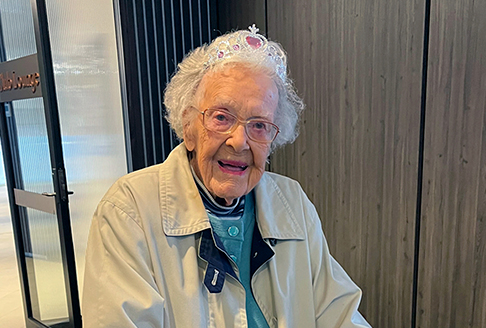
Meet Jean Wilson
I was born in Harrow in the UK. I married my late husband Granville in 1946 and moved to Australia in 1950. I have five children, eight grandchildren and six great- grandchildren.
- 17 Apr 2023
-
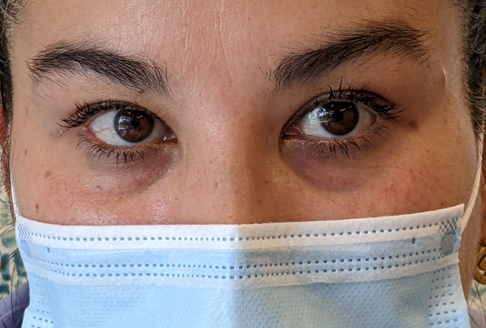
For Monica, the eyes have it
Great communicators use whatever tools they have available to make a connection.For Monica Miranda, that means maximising the impact of her eyes.Monica started work as a Personal Care Assistant at Baptcare Coasthaven Aged Care Community just before the Covid-19 pandemic hit Australia.This means that (like all staff) she has worn a mask for almost all of her three-and-a-half years at Coasthaven. It is very important that staff wear masks and other PPE as appropriate, as a way to keep everyone safe.However it means that most residents have never seen her full face.“They all know us by our eyes,” Monica says.“Communication is such an important part of our work, customarily we use our whole face when we communicate, but when I’m working I only have my eyes, so I use them as well as I can to communicate with our residents. I try to be the best ‘eye communicator’ I can be.“The best way to look after someone is to really get to know them. If you know a person’s story you will understand their preferences, and how you can then best meet their needs.“Before starting this line of work I did a lot of research. Working in aged care was not a random decision.“I am doing this job for the right reasons – because I believe in caring, and I want to help people. With this industry, you have to be here because you really care. You need patience, tolerance and caring. It is the right job for me because I really enjoy connecting with people.”Originally from bustling Bogota in Colombia, Monica now calls Geelong home. “Bogota is a very busy city, but in Geelong everything is close. I love heading down to Torquay or Anglesea to walk along the beach,” Monica says.“When I started at Coasthaven I was the first staff member on the ground floor, when we had only three residents there. Now every room on the ground floor is full, which is great.“You have to work in other places to really understand how great Coasthaven is. Coasthaven is heaven, because we have staff ratios that allow us to connect properly with the people we care for.“We have the time to truly do our job properly, and managers who know that care is the absolute centre of everything we do.”
- 11 Apr 2023
-
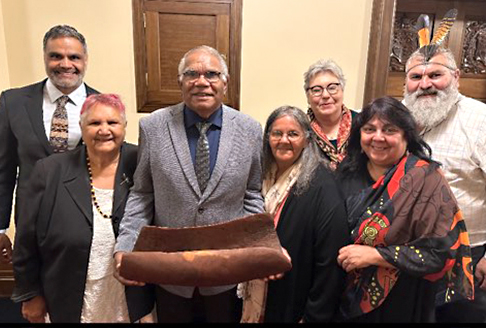
Baptcare’s Uncle Charles invited to be part of historic Bill signing
Baptcare congratulates Uncle Charles Jackson OAM on his recent involvement in a moment of historic importance: the signing of the bill recognising the First Nations Voice to the South Australian Parliament.Uncle Charles is a valued part of Baptcare’s Family and Community Services team and works as an NDIA Local Area Coordinator in South Australia’s Yorke Mid-North region.Uncle Charles was one of a select group of Aboriginal community members invited to walk with the Speaker of the House, Terry Stephens, as he delivered the Bill to the Governor, and to witness the signing of the Bill.This invitation acknowledges Uncle Charles’ dedication and commitment to the development and progression of this Bill.“The day brought lots of emotion for me personally,” Uncle Charles said.“There were five or six thousand people gathered there to celebrate ‘The History in the Making’.“This milestone in our state has laid the foundation for the rest of the states and federal governments to do likewise. The passing of the Bill will give First Nations people the capability to advocate, negotiate and influence the policies that have direct responsibility for service delivery.“At present, there are no mechanisms within the government framework to involve Aboriginal & Torres Strait Islander people. What we have now is a legislative document which stipulates how the government process will work when dealing with matters that concern First Nations people.”Baptcare is proud and grateful to have a person of such stature working with us. Congratulations Uncle Charles!
- 06 Apr 2023
-
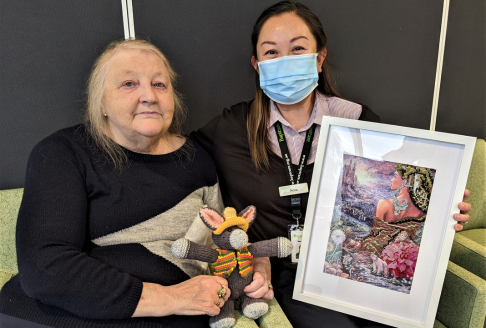
Pauline showcases the power of art at Coasthaven
Pauline Tilley has magic in her fingertips. She knits, does cross-stitch and paints. Her work is a highlight of the Artist In Residence exhibition at Baptcare Coasthaven Aged Care Community.She is also a great supporter of her fellow creatives. In a speech to welcome Baptcare CEO Geraldine Lannon to the art show, Pauline said, “Art can be described as vibrant, vivid, dramatic, animated, stimulative and evocative.“When the concept of this was originally put to us, little did we know what ideas would germinate from those first thoughts. From behind closed doors came an incredible array of artistic talents. People have been beavering away in their rooms creating their amazing works of art. We have painters of all genres, woodcarvers, knitters, crocheters, pen and ink artists, needleworkers, diamond painters, and those who just love to colour in.”Pauline has lived at Coasthaven since 2020. Her life story includes growing up on a dairy farm near Apollo Bay, working in a frock salon, training as a woollen fabric mender, working for the railways, in catering and family assistance in the social welfare sector. No matter what work occupied her days, she always made time for art and craft.“I get a great sense of satisfaction knowing I can do these things,” Pauline said. “I do all sorts of knitting, including Fair Isle and Aran. I make dolls.“One of my latest enthusiasms is diamond painting, where you place tiny dots of colour on a canvas, following a set pattern – it is similar in that regard to cross-stitch. It is very time consuming and tests the eyesight, but I like the result.”Organising the exhibition as part of the resident-led art committee was an eye-opener. “The amount of artistic talent we have here at Coasthaven I simply didn’t know about before. It has given us a sense of achievement and a sense of belonging.”Pauline regularly attends nearby Cloverdale Community Centre for art lessons. So far she has learned acrylic and oil painting, and she is looking forward to starting with watercolours soon. Her bigger goal is to take an online course through the Royal School of Needlework, based at Hampton Court in England.“Pauline is absolutely amazing,” Coasthaven Lifestyle Coordinator Nora Wee said. “Her talent is incredible, and we are so proud to be able to nurture her interest in art, and the work she has done to help stage the exhibition has been a real gift to her fellow residents.”
- 04 Apr 2023
-
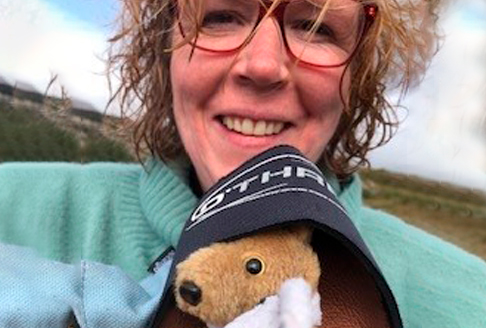
Meet Melanie Abbott our Faces of Baptcare #38
In this world, there are some people who just talk. Then there are those other special people who actually walk the talk. Our Melanie Abbott is one of those people, although in her case, she swims the laps…For the month of March, Mel has been involved in a fundraiser with Laps for Life and Reach Out organisations, raising money to prevent youth suicide.“This March, I’m swimming to save lives,” says Mel. “I’m swimming laps to make sure young people in Australia have the mental health support they urgently need.”As her colleague Ashley Vincent commented, “Mel has an exceptional capacity to give.”Find out more about Mel below: What is your role at Baptcare and can you describe a typical day in your job?My current role is Senior Mental Health Practitioner in the Mindset Foundations program in southern Tasmania, and a typical day isn’t a thing! Each day is different as I spend time out and about with clients working on their goals in their own real life environments. This means coming into the hub, collecting a car, having a chat to colleagues and then heading out across the south with a coffee and an audiobook. Some days I drive 177km to see someone and assist them with attending appointments or facing fears by going into a shopping centre etc. The part I really enjoy most is helping people work out what it is about a task or situation that is triggering for them and then helping them nut out strategies to give them the capacity to do things independently.Wow – that’s a lot of driving! Can you recommend a few audio books you’ve listened to recently? Do you play any particular music while you’re driving?It depends on what sort of things are happening for the people I am seeing on any particular day. I do like a bit of Classic FM if things have been particularly heavy but other than that I quite like lighter audiobooks. However, there have been a few good reads about people living with mental health concerns lately: Kim Lock’s The Other Side of Beautiful, Emily Maguire’s Love Objects, Rose Cartwright’s Pure and Meg Mason’s Sorrow and Bliss. All these have protagonists with mental health challenges but the stories unfurl with compassion and kindness. Another book I need to rave about – it provides a hopeful take on childhood trauma - is Tabitha Bird’s A Lifetime of Impossible Days. Somehow Tabitha manages to bring light and love into a very dark space by having her main character travel back in forth in time and then there’s the gumboots…What do you like about working with Baptcare and in the mental health space?It’s all about the people I work with. They always surprise me with their amazing tales of survival and resilience (even if they can’t see it at the moment we start our journey together). Our clients are some of the most amazing people. Every day that I have the privilege to listen and be with them is humbling. Did you always want to work within the mental health space? I came into Social Work after working at University of Tasmania (UTAS) in Asian Languages and Studies and then in local government in regional Japan, so mental health wasn’t a space I thought I’d end up working in. Once I found this job though, I was pretty soon hooked. It’s a role which helps people develop hope and confidence in themselves and it is a privilege to see people face fears and grow. We have a lot of flexibility in how and where we work and that makes the program fit so many people. How long did you live in Japan and did you notice any major cultural differences in their approach to mental health?All up I lived in Japan for four years. It’s pretty interesting as there seems to be a stronger taboo about discussing mental health issues in general in Japan, and yet media coverage of suicide, and particularly youth suicide is much more open. In the 1990s it was very common for a local teen suicide to be covered in quite a bit of detail with the obligatory classroom shot – with one desk covered in flowers. However, asking for assistance or treatment for mental health conditions was very secretive. This may have changed a bit, and there was a lot of work done following the Great Hanshin Earthquake in 1995 and I would suspect after the tsunami and Fukushima nuclear disaster in 2011 when so many people really struggled to cope with what had happened. I don’t want to criticise Japan or Australia or any other country for their approach to mental health as it is so tied to all sorts of aspects of culture and context. There’s good and bad in any country’s approaches to mental health and, more to the point, so much work and change is happening in this sector all the time. We see that you are currently doing a fundraiser (Laps for Life) to raise money for youth suicide. What inspired you to do this? I’ve been enthusiastically snorkelling with a group of passionate women in the SNOT (Snorkel Nerds of Tasmania) group this summer and have loved being back in the water. There are so many fundraising and exercise programs out there I couldn’t resist when something that combined swimming and mental health came up. What have you learnt about youth suicide from working with Mindset? Our program works with people aged 18+ and most people I have worked with are much older than the youth age group. I did work with someone who had just become an adult and listening to their parents talking about not being able to find youth services that actually offered practical assistance was a bit of an eye opener. Also, when I shared this on my personal Facebook I was very conscious that quite a few of the people on there have deep personal grief as a result of youth suicide. And now for a few personal questions… What did you want to be when you grew up? An interpreter at the UN – those booths look amazing.Can you tell us something surprising about yourself? I don’t eat crayfish after learning too much about how they procreate while interpreting between Japanese and English at an international symposium. Do you have a favourite quote or motto in life? How can you choose just one? How would your friends describe you? Reeking of chlorine at the moment I suspect? Can you describe your ideal weekend to us? Time to swim or snorkel, potter in the garden, bake something, read, yoga and have the house faeries magic the house into submission! Do you have a mentor or idol? OR If you could sit next to someone at a dinner party, who would it be and why?The two times I have met idols - Julian Burnside and Rodney Croome - I have been almost too overwhelmed to speak so it would be a very quiet dinner! Some questions about swimming: How bad are the prune-y hands and green hair factors? If you keep moving at a decent pace the prunes stay away. I’m a fading redhead so am safe from the green hair issues. Do you have any special swimming routines? Try not to think about how much further and faster I would have been as a teenager when I was training seriously, and listen to my body. I try to relax into the rhythm and let my mind wander, today’s pearl of wisdom was “lap 43 is just as important as lap 1 and lap 50”. What have you learned about yourself/and swimming from doing this challenge? And do you think you’ll become one of those iceberg winter swimmers? Unfortunately, my asthma doesn’t play nice if I try to swim distances in cold saltwater. I deliberately bought a longer pass to the pool to encourage me to keep it up. Having been a competitive swimmer back in my teens, maybe this is me starting my late in life swimming routine?
- 30 Mar 2023
-
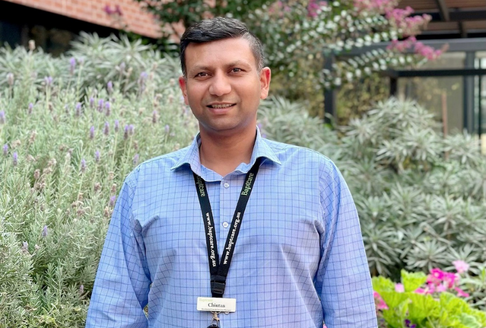
Faces of Baptcare #37 | Meet Chintan Patel, Resident Care and Services Manager at The Orchards Aged Care Community
What does a typical work week look like for you?I have responsibility for maintaining the quality of our service and smooth functioning of our community. I do a lot of planning, implementing improvements and observing what is going on day to day.I think that’s the essence of being a good leader – what you do has a lot more impact on people than what you say. You must deliver.There’s usually a list of things I’m working through daily, for example, roster management, staff questions/people management, resident and relative queries, risk assessment, etc. There are certain targets and deadlines I need to keep to. It’s important to prioritise matters, attend to things and resolve them each week to ensure we continue to deliver a safe and effective service which maintains and improves the quality of care to our residents. The main goal is to ensure our residents have a safe and healthy environment to live in.To me, it’s not just about exceeding quality standards, it’s also about providing consistent care each day and constantly looking for continuous improvement across everything we do.Is there any special training required to become a Resident Care and Services Manager (RCSM) in the aged care sector?In my case, I am a Registered Nurse. I started my professional journey in the health sector in 2007 and then moved to aged care where I worked in various support services and quality roles before moving to an operations role. I have worked in not-for-profit organisations as well as ASX-listed aged care providers. I joined Baptcare as a RCSM in October 2022 and feel great to be part of The Orchards Community.What kind of ‘soft skills’ are required to be successful as a RCSM?Working as a RCSM is a highly rewarding leadership role requiring compassion, passion, experience and exceptional decision-making skills. You must understand that the decisions and actions you take have a direct impact on the lives of people around you.I see you have a Masters in Biotechnology – tell me more about that.Maths and Science have been my favourite subjects since school. After completing secondary school, I studied for a Bachelor of Pharmacy and then a Masters in Biotechnology. At university, I did research on cryopreservation techniques and wrote a thesis on “cryopreservation of garlic germplasm utilising vitrification method and plant vitrification solution 3”. I’m happy to say, the result was excellent and demonstrated that it is commercially feasible and there’s a possibility for regeneration of virus free garlic.Why do you like working in aged care?I’ve been working in health and aged care for more than 15 years now and have enjoyed every role and never wanted to look for any other career options. I feel very satisfied when I make positive changes in the lives of older people in our care and their families. I always want to make sure residents have the freedom to do what they want wherever possible and enjoy staying with us.I really strive to create a homely environment as much as I can because this is our residents’ home . I know I’ll continue to work in this sector because I enjoy helping vulnerable people in our community.What was your first job?My first job was working in Customer Assistance at Woolworths. I learned how to use my people skills and empathise to understand the feelings of some very frustrated customers so I could respond positively to any problems and build good relationships with them. It was a great opportunity to gain experience about customer service and communication.Your Baptcare colleagues sing your praises and have commented on how they feel inspired by your kindness, dedication to our residents and leadership skills. What keeps you motivated and how do you keep others motivated?The most important things motivating me are the smiles and sense of reassurance I see on the faces of our residents and staff. Building trust is so important – you need to prove your presence by making positive changes with visible improvements to allow people to start building their trust in you.All challenges and complaints are welcome – they are opportunities for improvement. My hunger to find solutions keeps me motivated.Similarly, staff need acknowledgement to stay motivated and feel inspired every day. I always make sure that hard work and extra effort are acknowledged, and everyone feels like a valued member of the team. I try to walk around The Orchards Community to meet staff on the floor, say hello and acknowledge their presence at work.I talk about opportunities for further development and growth and give staff the space they need to thrive. I always make sure they are happy and feel supported at work and that the workplace environment is safe and relaxing. That way, everyone feels happy and ready to come back on their next shift.What do you like to do in your spare time?In my free time, I love to go for a walk and connect with nature. It helps me to relax my mind and body and I feel healthy and more energetic. Sometimes, I plan a walk with my friends so that we can have meaningful discussions – it helps me to think outside the box. I also enjoy spending time with my family, playing indoor and outdoor games with the kids – and answering their endless questions!Thank you Chintan, for your relentless pursuit of service excellence at The Orchards. We are truly grateful for everything that you and your team do to help our residents live their best lives.
- 28 Mar 2023
